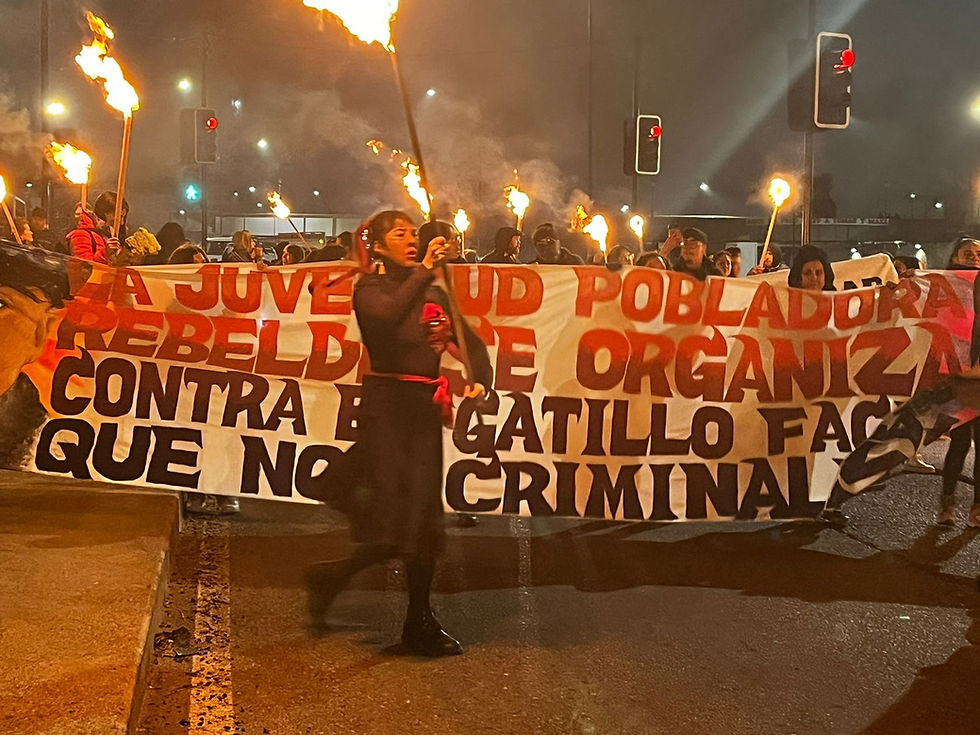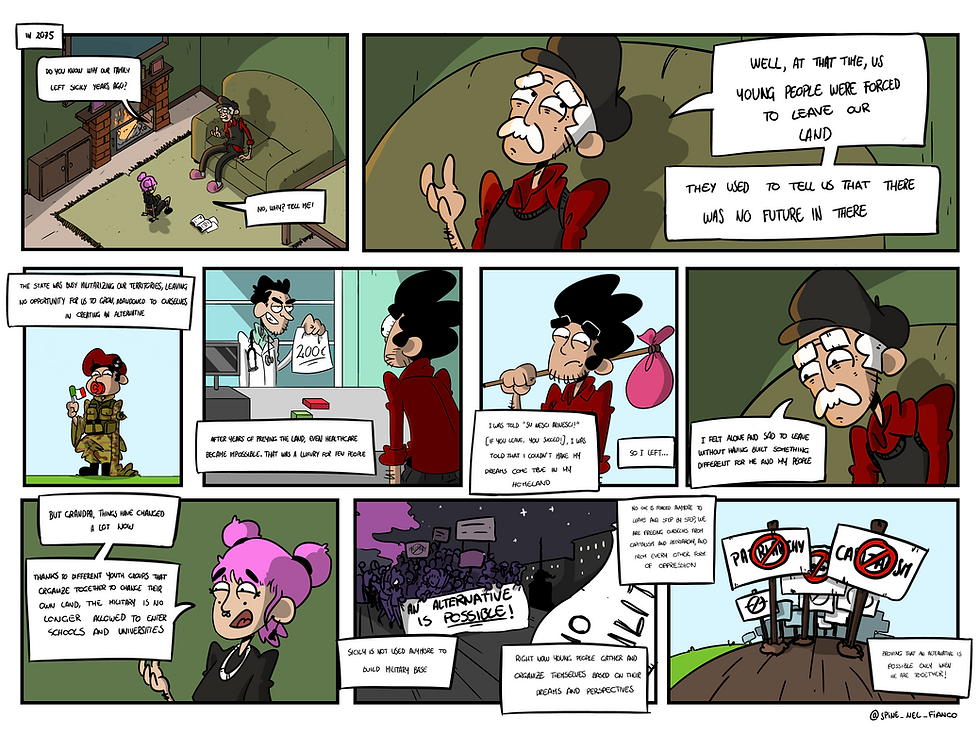THE FIGHTING YOUTH OF OUR TIME: A view from the Territorial Assembly of Juan Antonio Ríos, Independencia, Santiago de Chile
- Lêgerîn 2

- Aug 16
- 6 min read
In the population of Juan Antonio Rios, in the heat of the popular uprising that took place in October 2019, a territorial assembly was self-convened among the residents. It initially lacked a concrete objective but responded to the need to organize life in the face of the new scenario that the uprising created. From that date until today, our population has maintained grassroots work that has overflowed into other areas, surpassing the initiative of the assembly and generating a response to problems such as supply, youth, work, education, sports and political analysis to guide our paths.
Since then every year, and on each date that is important for our people, we carry out political and cultural activities to work on the memory and to reflect on current issues. On March 29th, we commemorated the Day of the Fighting Youth, in memory of Rafael, Eduardo Vergara and Paulina Aguirre, young people who were killed in 1985 in the midst of the military regime.
To this end, we held a discussion among the organizations of the area and we listened to the families and friends of the four young people killed in our neighborhood. Thanks to this, we were able to hear different stories of youth, reflect on what youth means for us and synthesise the day into this article and as our contribution.

On March 29th we commemorated once again the Day of the Fighting Youth in Chile. This day is dedicated to the memory of the comrades Rafael and Eduardo Vergara Toledo, 18 and 20 years old respectively, who were killed in 1985 in Villa Francia, a historic neighborhood in Santiago. As well as in memory of Paulina Aguirre Tobar, a young militant of the MIR (Movimiento de Izquierda Revolucionaria), 20 years old, who was killed on the same day, on the same date. These three assassinations took place during the Pinochet military regime and were a part of the state violence of the time which sought to silence all attempts at resistance.
We are no longer under a dictatorship, but we are still being killed...
Our people are stained with blood from the violence of the state and it’s various tentacles and our population has not been oblivious to this. In order to listen and analyze the youth, we invited relatives and friends of four of our neighbors who were murdered; Carlos Godoy Echegoyen, Maximiliano Rodriguez, Tomas Perez and Alonso Verdejo.
The militant youth of the 80's were responding to a historical process in our country, and there were also seeds of revolution in our population. An example of this is the life of Carlos Godoy Echegoyen. He was a socialist militant, as was his entire family. Rafael, as he was nicknamed, was at the forefront of important political tasks and popular mobilizations. He was capable of this through his high level of organization, efficiency, discipline and dedication. One of his main tasks was the political training and organising the mass resistance of the young socialists of the time, a task through which he made an important contribution to the popular struggle until the day of his death.
How do we face the challenges of today's youth?
The first thing we would like to point out is that it has been a challenge for us to characterize today's youth. There has been a tendency by social movements when analysing the youth of Chile to focus on the militant profile of the political parties of resistance in the midst of the military dictatorship. What we still consider appropriate within that time is that the revolutionary values that were developed during that period have left their mark on the history of the popular movement, providing principles such as consistency, discipline and courage, which were expressed in life and death by the young fighters.
But are these values still present in our youth today? Or in ourselves? And the answer is that we believe that the determination of the youth of the 80's is still valid and present in the most recent processes of social mobilization. Proof of this is the student movement, which has continued the rebellion of our people since the toppling of the dictatorship, the Penguin Revolution in 2006, the mobilizations of 2011, and a series of strikes, takeovers of institutes and universities, to finally jump the turnstile of the subway and start the biggest popular revolt that our eyes have seen. And the fact is that the virtue of the youth to promote revolutionary processes in Chile has been cultivated through the study centers, which are strongly criminalized today, of course we already know for what reasons.
But why doesn't this flame reach all the young sectors of our population? In our neighborhood, the youth who we are connecting with, following the death of Maxi and Tomás, are not even allowed to finish school because of the stigmatized profile they have. This leads us to think that there are different types of youth, that although they have similar values throughout history, they are silenced in different ways. If you are a secondary school youth, you are silenced through repressive laws or the dismantling of public education and the young people of our population are subjected to condemnation, marginalization, or simply killed with impunity.
For this reason, we have recently increased our concern for the youth of the pobladora, because we see here the greatest potential of our class, and we firmly believe that these youth deserve the fruits of organization. But what are these fruits?
Organization gives us the tools to be able to confront this powerful enemy, so it is important to share these analyses among the organizations and to know what we are doing for these youth, how we can strengthen ourselves and to provide, in a more coordinated and systematic way, this support to children and youth.In our area we have created initiatives for the popular youth. An example of these spaces is the Comedor Popular Maxi Rodriguez, created by Maxi's mother and sister. They have transformed their pain and anger into struggle and love for young people, creating a safe environment for them, free of condemnation, where they can be heard, loved and recognized. Other examples in the area are sports projects, such as the basketball workshop in which Alonso Verdejo participated. An example of popular sports, as is the Carlos Godoy Echegoyen Sports Club. All these initiatives respond to the search for safe recreational spaces for and by the youth, promoting healthy relationships among the participants. Also among the organizations that have emerged in recent times, there is a popular pre-university Yoshua Osorio, which provides popular education tools to young people who want to take the admission exam to university education.
Although these spaces have developed spontaneously, with the discussion held to gain an understanding of the situation of young people, we realize that we can improve some practices of those who make up the organizations. And here the first thing that came out of the discussion: the need for these spaces to be created by them and for them; where they can make decsions and propose ideas. For that we need to listen to them, get closer to their lives and interests. There is a tendency to use young people as a tool because of the energy that characterizes them. But we cannot continue to let people think like this, because it replicates a practice from an older politics and does not contribute to the youth claiming their rightful place in society.
Furthermore, we believe that it is important to understand ourselves, our identies and what that means politically, as poor, as class, as women, as youth, we need to recover our identity as a people that has been lost in the hands of neoliberalism. Whatever the organization, its ideology and characteristics, be it anarchist, communist, socialist, indigenist, etc., we seek to generate a common identity as one of struggle. One always based on respect for our differences and non-imposition and against individualism, competition, consumerism and the empty and consumer identities generated by social networks and media.
Finally, among the reflections that have come out of our dialogues on youth, there is that of matching our words with actions. In this sense, we emphasize the importance of fighting not only externally, but also internally, in order to achieve a profound transformation. We have grown up in this system and its vices are also within us. Someone said, "95% of the battle is against our inner enemy”. So we have to fight day by day to transform these liberal and patriarchal practices. The enemy is waging a psychological war against us, so we have to fight against the personalities that capitalism has created.
Therefore, it is necessary that while we are confronting the common enemy, we also fight our inner enemy. From there, we can build and put into practice the life that we really want to live and not the one that capital has imposed on us. "Let us live today as we want to live in the future”. We must continue to fight, resist, organize and build. Up with the fighters and up with the youth of la pobladora.






Comments